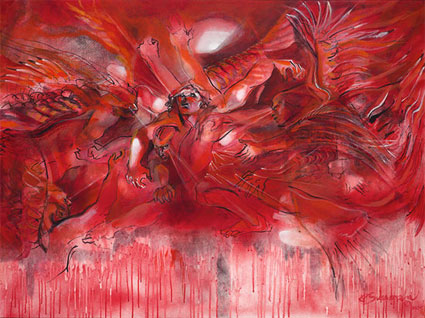A Man Under Authority
How are we to understand the need for Jacob to wrestle not only with Laban, but also with the angel of the Lord?
Abraham was given a miraculous son and his greatest test was to face the loss of that promised son. Jacob’s test was a similar loss of what had been gained through unity with God by Covenant. Both Abraham and Jacob had learned that they were not lords themselves but stewards under the Lord. Their authority was delegated to them. They were “Word incarnate.” Theirs was the authority of a head servant. They were Covenant vassals, and what was truly precious was their faithful relationship to God under this Covenant. James Jordan writes:
“Jacob had been willing to part with much if not most of his possessions; he sent a great deal of wealth to Esau in order to buy him off. With the blessing of God, Jacob’s scheme worked well. This was only because Jacob had wrestled with God. We aren’t told what Jacob argued with God, but we can know what it was from Genesis 32:11-12: “You can take my flocks and herds and give them to Esau, but please do not take my wives and children, for they are Your people and I am their protector.” God was pleased with Jacob and called him the victor.
Jacob had promised God a tithe, and now God had come to collect. God intended to give not only His tithe but everything to Esau, and that was the test for Jacob. And it is our test as well: ARE YOU WILLING TO GIVE ME YOUR ESTATE? That’s an easy question for a poor man to answer, so God asks the poor man for his son. God asks the rich man for his estate. Jacob was a rich man. Jacob had acted righteously and judiciously to build up his estate, but as we have seen in our previous essay, God thwarted his best efforts. God made it clear to Jacob that his estate had come from God alone, just as God made it clear to Abraham that his son had come from God alone. Now God seemed to want it back, and Jacob like Abraham was willing to give it. All he wanted in return was for God to bless him, and God did so.” [1]
Obedience gathers and diobedience scatters. The Spirit creates unity and builds an environment of worship around and beneath the faithful Covenant mediator. As the mediator looks to God, the worshippers look to the mediator. His heart and his eyes are to be set on the Father and not on his inheritance. The latter is dependent upon the former.
Jacob’s “ascension” over Laban—man over beast—could have filled him with pride. If the mediator (the one “lifted up” by Covenant) looks to himself as “Word/Law” and begins to lord it over those gathered under him by the Spirit, the environment of worship “in spirit and truth” is broken. It can be counterfeited for a time, but unity by coercion never lasts. Perfect fear casts out love. The Law can only kill.
Satan’s attempted counterfeits of totus Christus always destroy themselves from within. There is no Christendom without the Spirit of Christ. The parts of the body do not trust each other. The Harlot and the Beast might be a hot celebrity item tonight but tomorrow one will devour the other. It is phone-sex, a short-lived mutual masturbation, not a marriage. To maintain a corporate “body,” the head must be full of truth and love. Herod’s kingdom is eventually shown to be a whited sepulchre.
“And because lawlessness will abound,
the love of many will grow cold.”
Matthew 24:12
So, much faith on the part of the mediator is required. Just as authority is delegated to us, so we must be willing to delegate it to others in love—by Covenant. Whether it be pastoring a church, fathering a family or running a business, taking kingdom matters into one’s own hands—as Adam did—is always a temptation. But the hands-on security it offers is false. Only the Spirit can gather in truth. We must be willing, like God in the garden, to leave people alone for a while to work out their own salvation. There are Covenant blessings and curses, but both vengeance and redemption are to be left to God. We must be willing to be both encouraged and disappointed by others. God gives the increase. We are unprofitable, but grateful, servants.
Those under Covenant have the authority of vassals. Adam must be a man under authority, not the man of lawlessness (2 Thessalonians 2:7-9). The centurion understood this (Matthew 8:9). Like Christ, we are to be Sacrament, a bloody channel between His Word (Father) and His Government (Spirit). Unless the Lord builds the house, we labour in vain. [2] Jacob understood that the true source of his inheritance was not Laban but the Lord. Like Christ, he wrestled alone and was broken in secret. That was the real battle. Like Christ, he was rewarded openly, in public, by the Father. [3]
“You have loved righteousness and hated lawlessness;
Therefore God, Your God,
has anointed You With the oil of gladness
more than Your companions.”
Hebrews 1:9
_____________________________________________
[1] James B. Jordan, Crisis Time: Patriarchal Prologue, Part 3, BIBLICAL HORIZONS, No. 111.
[2] In the Tabernacle framework, the mediator is the prism that breaks down the white light of Word into the rainbow of Covenant. The Spirit gathers the saints and builds the city around the blood of the Lamb.
[3] For more on this Biblical theme, see Behind Closed Doors.


























